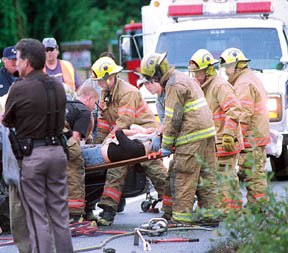Concern, though not panic, appears to be the attitude of Island County emergency medical service and fire district professionals as they brace for the funding cuts that would come with the passage of Initiative 747 in next month’s election.
“It presents problems,” said Island County Emergency Medical Services manager Roger Meyers. “Obviously, we would have to tighten our belts in areas.”
The initiative, which proposes to freeze the annual rate of property tax increase at 1 percent, would take a considerable chomp out of property tax funding to county taxing districts. According to a recent report released by the state Dept. of Revenue, the adoption of I-747 would cost Island County EMS $67,000 in funding next year, and $488,000 over a six-year span.
Meyers was circumspect in assessing the potential impact of I-747. “I think we have to wait and see,” he said. “The short answer is, ‘Yes, it’s going to have an impact.’ To what degree, we don’t exactly know.”
Meyers added, however, that any potential cutbacks in emergency services would more than likely take place at the administrative level or in the realm of long-term capital investments. “We don’t foresee any decreased service to the public,” he said. “That’s where we’ve got to put the focus of the capital that we have.”
Meyers added that, in the years to come, dealing with EMS budget cuts will probably entail making do with less in areas that don’t threaten the ability to respond to crises. “We may have to make an ambulance last a little longer than we do now,” he said.
One “fortunate” coincidence in the current dilemma over I-747, Meyers said, is that Island County EMS had already planned on going to the public with a levy next year, as part of its regular funding cycle.
Whidbey General Hospital CEO Scott Rhine said that such levies are a traditional form of funding for emergency services on Whidbey Island, and that “we will continue to present our best picture of what needs to be done,” and leave it to the voters.
“There’s a responsibility we feel… to present our case,” said Rhine. “If we can’t do that in a way that convinces voters that this is something of value, then we will have to make the decisions accordingly.”
Rhine said it’s possible that the adoption of I-747 could influence what EMS asks for in the next levy. He also pointed out that, as a hospital district, Whidbey General has other sources of revenue that can somewhat absorb the impact of potential funding cuts.
However, Rhine said, because fire districts often lack other sources of revenue, the passage of I-747 could prove “especially difficult” for them. The Dept. of Revenue report predicts a loss to Island County fire districts of $219,000 in 2002, with an accumulated loss of over $1.6 million by 2007.
Central Whidbey fire impacts seen
Central Whidbey Fire & Rescue Chief Joe Biller said that I-747 would “hamper some of the plans that we have set aside,” though as far as services are concerned, “it won’t hurt delivery.”
Biller said that his department is presently drawing up its 2002 budget, and that alternatives have definitely been considered depending on I-747’s fate at the ballot box. “Obviously, (the initiative) kind of forces us to have the budget we’d like and the other one, where we’d have to tighten our belt,” he said.
In the latter instance, Biller said that long-term capital expenditures in the fire district “would definitely be put on hold,” though he didn’t rule out the possibility of approaching voters with a special levy for further funding. I-747 allows taxing districts to go to the voters to ask for money beyond the 1 percent limit.
“We’ve been trying to live off the property tax,” Biller said. If a good portion of that is taken away, “we’re going to have to change our plans.”
Of course, the events of Sept. 11 combined with subsequent concerns over biological terrorism have only increased the focus, both nationally and locally, on the necessity for strong fire departments and EMS units and good emergency preparedness in general. Recent television ads against I-747 have utilized testimonies from fire and emergency workers, emphasizing the timely need for continued government support.
“They couldn’t have picked a worse time for 747,” said Meyers, the EMS manager. He added that, in the last few weeks, Island County EMS departments have held numerous planning sessions addressing the recent threat of bio-terrorism.
“There’s dollars attached to that,” Meyers said. He added that it would be a mistake to start cutting back on training and planning, and that making things work might entail some “cost-shifting” from other areas.
“Bottom line is it’s kind of an administrative problem at this point,” said Meyers. “We’ll make it work somehow.”
He added that, even were I-747 to pass, his department “can assure the public that it’s not going to affect patient care directly.”



